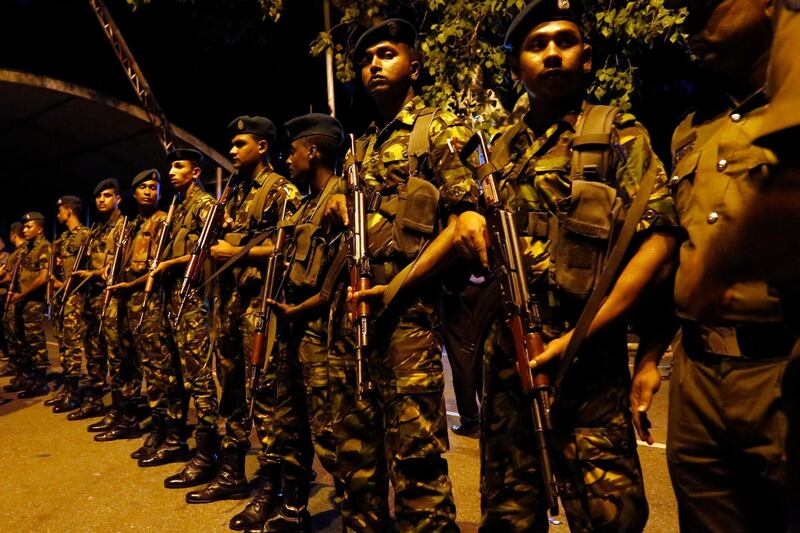Sri Lanka's top-ranking military officer surrendered to court on Wednesday after weeks evading arrest for allegedly protecting the chief suspect in the high-profile murder of 11 people during the island's civil war.
Admiral Ravindra Wijegunaratne, dressed in full military regalia, appeared at the Colombo Fort magistrate flanked by supporters and serving navy officers.
The court was told Mr Wijegunaratne shielded a naval intelligence officer accused of 11 murders in the closing stages of Sri Lanka's bloody separatist war that ended in 2009.
Three warrants for Mr Wijegunaratne's arrest were issued by the magistrate in early November but the Chief of Defence Staff, the highest military official in Sri Lanka, had refused to surrender.
In a dramatic new development, prosecutors told the court that Mr Wijegunaratne and his bodyguards tried to abduct a key witness at the weekend who had previously testified against him.
He has denied all allegations and sought bail Wednesday.
Investigators say Mr Wijegunaratne helped Chandana Prasad Hettiarachchi, a navy intelligence officer and chief suspect in the murders, escape arrest.
Mr Hettiarachchi, who is separately accused of involvement in the 2006 murder of a Tamil legislator, was captured in August.
Police believe the 11 victims were murdered while in the illegal custody of the navy. Their bodies were never found.
Military figures were accused of abductions and extrajudicial killings during the 37-year war against the Tamil Tiger separatist movement.
_______________
Read more:
Sri Lanka's new PM may lose budget even as he clings to power
[ Sri Lanka’s new foreign minister: crisis was a case of who reached for the gun first ]
[ Tamils fear bloody return of 'Lord of the Rings' Mahinda Rajapaksa ]
_______________
Several intelligence officers are facing prosecution over the murder of journalists critical of Mahinda Rajapaksa, the former president whose tenure was marred by allegations of war crimes and grave rights abuses.
His recent controversial appointment as prime minister by Sri Lanka's president has plunged the country into crisis, with parliament twice voting against the war-era strongman ruler taking over government.
Mr Rajapaksa, who has refused to step aside as Sri Lanka drifts in a power vacuum, and several members of his family are being investigated for fraud and murder during his ten-year presidency.
But those inquiries were thrown into doubt after his surprise return to the helm of government in an alliance with President Maithripala Sirisena.
Mr Rajapaksa lead Sri Lanka as government troops defeated the Tamil insurgency in May 2009, ending years of bitter and brutal fighting.
The final days of the offensive were marked by major abuses, according to rights groups. A UN panel has said 40,000 civilians may have been killed in the final stages of the war.





